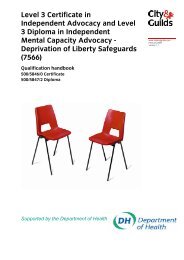Improving services and support for older people with mental health ...
Improving services and support for older people with mental health ...
Improving services and support for older people with mental health ...
You also want an ePaper? Increase the reach of your titles
YUMPU automatically turns print PDFs into web optimized ePapers that Google loves.
<strong>Improving</strong> <strong>services</strong> <strong>and</strong> <strong>support</strong> <strong>for</strong> <strong>older</strong> <strong>people</strong> <strong>with</strong> <strong>mental</strong> <strong>health</strong> problems<br />
Bereavement may be the cause of isolation <strong>and</strong> loneliness. The loss of a spouse,<br />
partner, family, friends <strong>and</strong> pets, to illness or death, can result in the loss of<br />
companionship <strong>and</strong> wider social networks.<br />
“Since my husb<strong>and</strong> died it has been worse. I don’t have a<br />
sense of purpose or meaning. Being on my own [makes<br />
things worse]”. 238<br />
Loss of friends can be devastating <strong>for</strong> <strong>older</strong> lesbians, gay men <strong>and</strong> bisexuals who tend<br />
to rely on friends more than family <strong>for</strong> social <strong>support</strong>. 239 Black <strong>and</strong> minority ethnic<br />
(BME) <strong>older</strong> <strong>people</strong> must be allowed to grieve in culturally appropriate ways. Other<br />
effects of bereavement, such as sudden responsibility <strong>for</strong> unfamiliar household tasks<br />
<strong>and</strong> disruption to daily routines, can be distressing. Those who do not learn new skills<br />
to h<strong>and</strong>le these tasks are at increased risk of long-term <strong>mental</strong> <strong>and</strong> physical <strong>health</strong><br />
problems. 240 Bereavement is a particularly important issue in care homes, where<br />
turnover of staff <strong>and</strong> residents is high <strong>and</strong> relationships are frequently disrupted.<br />
Unpaid carers are at heightened risk of developing <strong>mental</strong> <strong>health</strong> problems due to<br />
stress, pressure <strong>and</strong> lack of financial <strong>and</strong> social <strong>support</strong>. They may cherish their caring<br />
roles but also feel loss, frustration <strong>and</strong> sadness as their relationship <strong>with</strong> the person they<br />
are caring <strong>for</strong> changes. Many carers of <strong>older</strong> <strong>people</strong> <strong>with</strong> <strong>mental</strong> <strong>health</strong> problems are<br />
<strong>older</strong> themselves <strong>and</strong> their caring responsibilities can have detri<strong>mental</strong> impact on their<br />
own physical <strong>and</strong> <strong>mental</strong> <strong>health</strong>. Carers of <strong>people</strong> <strong>with</strong> dementia are at particular risk;<br />
one-third of this group has depression.<br />
Moving into a care home can be a relief but may also involve the loss of<br />
neighbourhood <strong>and</strong> community. Leaving a family home is another loss to be dealt<br />
<strong>with</strong>. Depression is more common in <strong>people</strong> who have recently moved into a care<br />
home, especially if they have moved there from their own home. 241<br />
Wider factors such as age discrimination, lack of opportunities to participate in society,<br />
poverty <strong>and</strong> social exclusion also impact negatively on <strong>mental</strong> <strong>health</strong> in later life. These<br />
themes were explored in the Inquiry’s first report. They provide the backdrop <strong>for</strong><br />
individual experiences of depression <strong>and</strong> anxiety.<br />
“Suddenly here I am, a shadow of the person I used to be <strong>and</strong><br />
sometimes not even feeling that person… <strong>and</strong> this awful feeling<br />
as I say once you are old you are on the scrap heap really,<br />
nobody wants you.” 242<br />
4.2.2 Preventing depression <strong>and</strong> anxiety<br />
Reducing the risk factors. Depression <strong>and</strong> anxiety can be prevented by minimising<br />
the occurrence of risk factors such as physical disability <strong>and</strong> illness, sensory impairment<br />
<strong>and</strong> social isolation. Physical activity 243 <strong>and</strong> <strong>health</strong>y eating 244 protect against depression<br />
<strong>for</strong> <strong>people</strong> of all ages <strong>and</strong> should there<strong>for</strong>e be encouraged. Regular vision <strong>and</strong> hearing<br />
tests can identify potential problems at an early stage <strong>and</strong> prevent <strong>people</strong> from being<br />
48

















